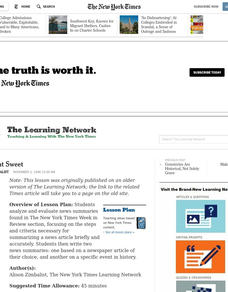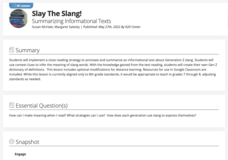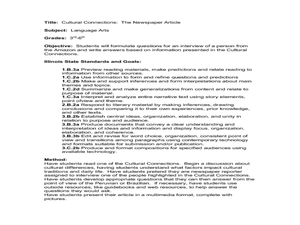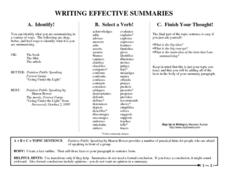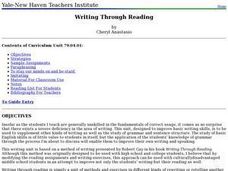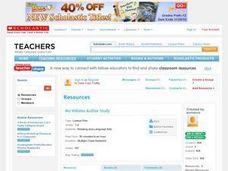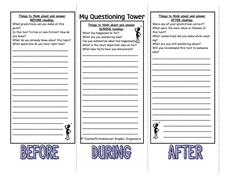Polk Bros Foundation
How to Summarize a Non-Fiction Passage
After reading a text, one way to find out how much your class comprehended is to ask your pupils to summarize. This worksheet helps class members prepare for writing a summary of a nonfiction text. They note down the topic, up to eight...
Polk Bros Foundation
Comprehensive Nonfiction Reading Questions
Analyze any nonfiction text with the set of questions on this sheet. Class members practice inferring by noting the main idea and purpose of a passage. They also analyze an opinion in the passage and write a brief summary. See the...
Curated OER
Short and Sweet Science
Readers learn how to summarize scientific text and evaluate the advantages, disadvantages, and challenges in writing summaries. They select science-related articles you've pulled and collected from the New York Times and, with a partner,...
Curated OER
Short But Sweet
After analyzing and evaluating news summaries found in the New York Times "Week in Review" section, middle schoolers study the steps for summarizing a news article briefly and accurately. They write two news summaries: one on a newspaper...
Polk Bros Foundation
I Can Analyze a Story or History Completely and Carefully
Start off analysis of a text with a worksheet that asks pupils to complete several tasks. Class members note down a couple of characters or people and their distinguishing traits, describe the most important event, summarize the text...
National Math + Science Initative
Reading an Informational Text: "It All Started with Sputnik"
Sputnik was one of the greatest scientific advancements of the 1950s, and this reading lesson does it justice. Pupils start off with pre-reading questions and a video. They then read an excerpt from an article, which is accompanied by...
K20 LEARN
Slay the Slang! Summarizing Informational Texts
Middle schoolers get hip to the jive with a lesson about slang. They closely examine examples of slang and use context clues to infer the meaning of the terms. Groups read and summarize an article about a teacher who created a Gen Z...
EngageNY
Finding Relevant Information and Asking Research Questions: The Benefits of Video Games
Video games may not be so bad after all. As scholars read the text "The Many Benefits, for Kids, of Playing Video Games," they summarize the gist in their researchers' notebooks. Next, pupils draft supporting research questions based on...
Polk Bros Foundation
I Can Identify a Nonfiction Writer's Main Idea and Supporting Examples
Use this page to quickly identify the central idea of a text and organize ideas for writing an informational or explanatory text. The worksheet is split into two parts. In the first part, pupils note down the main idea and supporting...
Curated OER
The Newspaper Article
Have your class participate in an interview activity using an informational text about the Amazon. After reading a Cultural Connections story about a person from the Amazon, middle schoolers write interview questions based on the text....
Curated OER
Dragonwings: Evaluate Chapters 10-12
As your class finishes the novel Dragonwings, use these culminating projects. A vocabulary list is given for chapters eleven and twelve and either an epitaph or letter activity concludes the book. The final project consists of creating a...
Anchorage School District
Writing Effective Summaries
Drafting a strong first sentence for a summary is an important step. Writers can use the formula presented on this handout to get started. The resource lists three steps to put together a strong topic sentence, as well as tips and hints...
DePaul University
Learn about Fables
Expose young readers to a new genre of fiction with a short reading passage. After learning about fables, children identify the main idea and supporting details in preparation for writing a short summary. Read the text as a class,...
DePaul University
Working at the Television Station
There's a lot that goes on behind the scenes of a local news program. Read this passage independently or as a whole class to learn about all the different people that work hard to bring us the news. Afterward, young learners determine...
Curated OER
Language Arts: Writing Through Reading
Improve writing skills using methods from Robert Gay's Writing Through Reading; Gay espouses reproducing the work of successful writers to build the ability to convey original ideas effectively. Young writers transcribe, paraphrase, and...
Polk Bros Foundation
Science Learning Summary Guide
Apply reading standards to your science curriculum by asking pupils to complete this guide. Individuals note down important vocabulary as well as two ideas they learned and two supporting facts for each idea. They then take this...
Curated OER
Mo Willems Author Study
Who is Mo Willems? Explore the author with your class. Learners read books written by Willems, compare and contrast the characters therein, and make predictions about what will happen. Finish off this author study by having small groups...
Polk Bros Foundation
Common Core Constructed Response Organizer
Get your writers ready to compose a constructed response essay in response to either an informational or fictional text. Pupils note down the big idea they wish to address as well as up to nine examples from the text that they wish to...
College Board
Evaluating Sources: How Credible Are They?
How can learners evaluate research sources for authority, accuracy, and credibility? By completing readings, discussions, and graphic organizers, scholars learn how to properly evaluate sources to find credible information. Additionally,...
Curated OER
Summarizing
Young scholars analyze and summarize the main aspects of a news story. They find the "Who, What, Where, When and Why in a particular news story.In addition, they answer six questions over a particular story and then write a news story...
Tech Coach Corner
Understanding Sentences
Go over how to read complex sentences. Learners work on identifying key ideas, examining sentence structure, looking up new vocabulary, and paraphrasing. An overview of methods to help class members read difficult texts, half of the...
Teacher Printables
My Questioning Tower
Good readers think about what they are reading. They ask questions and make predictions before beginning a text. While reading, they summarize what has happened and note what they have discovered. After finishing, they check to see if...
Pennsylvania Department of Education
Using Literary Elements to Compare Fiction Texts
Students explore language arts by reading and reflecting on literary examples. In this fiction writing lesson plan, students read several different cultural versions of the story "Cinderella" and discuss their interaction with the story...
Tell City Schools
The Cay
Support your instruction of The Cay by Theodore Taylor with this extensive unit of materials. Provided here are prereading activities, worksheets and discussion questions for the entire book, and reading quizzes that you can use to check...
Other popular searches
- Summarizing Text Worksheets
- Free Summarizing Text
- Summarizing Text 3rd Grade
- Summarizing Text 2nd Grade
- Summarizing Text Samples
- Summarizing Text 7th Grade
- Summarizing Text Activities
- Summarizing Text Sheets
- Summarizing Text Content
- Summarizing Text Key Points
- Summarizing and Text Structure
- Text Comprehension Summarizing





